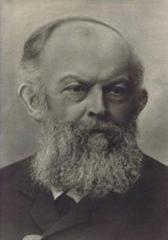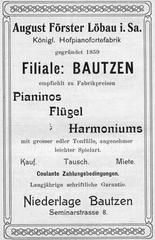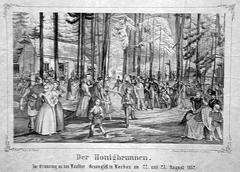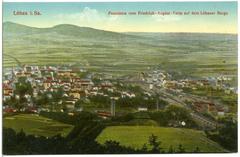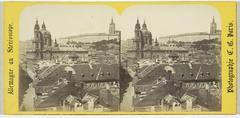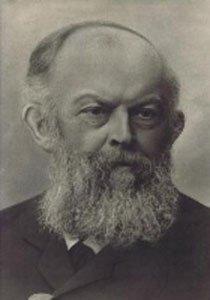
August Förster Visiting Hours, Tickets, and Guide to Löbau Historical Sites
Date: 15/06/2025
Introduction: The Legacy of August Förster in Löbau
Located in the heart of Löbau, Saxony, the August Förster piano factory is a living monument to more than 165 years of German piano craftsmanship. Founded in 1859 by Friedrich August Förster, this family-run manufactory has seamlessly blended handcrafting traditions with technological innovation, producing pianos celebrated for their resonance, durability, and elegance. The factory is not only central to Saxony’s renowned musical heritage but also offers visitors an immersive experience in the artistry of piano making—from the selection of fine local woods to the meticulous assembly by skilled artisans. A visit to August Förster provides both a journey into the legacy of a world-class piano brand and a unique perspective on the vibrant community and scenic beauty of Löbau. For the latest information on tours, visiting hours, and accessibility, consult official resources before planning your visit (musism.com; pianobuyer.com; Oberlausitzer PianoGalerie).
Table of Contents
- Introduction
- Historical Overview
- Craftsmanship and Materials
- Artistic and Cultural Significance
- Innovation and Adaptation
- Visitor Guide
- Travel Tips and Nearby Attractions
- FAQs
- Conclusion
- References
Historical Overview
Founding and Early Development (1859–1918)
August Förster’s roots stretch back to 1859, when Friedrich August Förster founded his piano workshop in Löbau (musism.com; pianobuyer.com). The era’s industrial boom and rising middle class spurred demand for quality musical instruments. Förster’s dedication to fine craftsmanship and innovation quickly earned the brand a reputation for sound quality and longevity. The factory’s hallmark became its use of premium local materials—solid mountain spruce for soundboards and beech for structural components (pianobuyer.com).
Interwar Years and Expansion (1919–1945)
During the interwar period, August Förster solidified its status as a leading piano manufacturer, expanding exports across Europe and beyond. The company’s instruments were renowned for their tonal clarity, responsive action, and beautiful design, crafted from select woods like spruce, mahogany, and oak (musism.com). The workforce grew, and the factory’s success contributed to the rich tapestry of German piano making.
The East German Era (1945–1990)
After World War II, Löbau became part of East Germany, and the factory operated under state control. Despite limited resources, August Förster maintained its high standards and artisanal traditions, managed by Wolfgang Förster, the founder’s fourth-generation descendant (pianobuyer.com). The company continued to export instruments, especially to the Soviet Union and Eastern Bloc countries, retaining a reputation for excellence and resilience.
Reunification and Modernization (1990–Present)
German reunification in 1990 marked a renewal for August Förster. The company returned to family hands, with Wolfgang Förster and later Annekatrin Förster leading modernization efforts while upholding tradition. Today, a team of approximately 40 artisans produces around 120 grand and 150 upright pianos annually, combining handcrafting with selected modern techniques (pianobuyer.com). The result is an enduring legacy of quality and innovation.
Craftsmanship and Materials
August Förster’s success is rooted in uncompromising craftsmanship and premium materials. The factory sources local woods—solid mountain-grown spruce for soundboards, beech for rims and pinblocks, and hardrock maple for bridges (musism.com). Each piano is hand-assembled, with every string individually terminated and actions precisely regulated for optimum responsiveness (pianobuyer.com). Cabinet designs range from classic to contemporary, reflecting both tradition and evolving aesthetics.
Artistic and Cultural Significance
August Förster pianos are esteemed by musicians, composers, and collectors worldwide. Their warm, expressive tone—known as the “Förster-Klang”—and refined touch make them favorites in concert halls and private homes alike (musism.com). The brand’s instruments have graced the hands of figures like Richard Strauss, Sergei Prokofiev, and Giacomo Puccini, and remain symbols of the Saxon musical tradition.
Innovation and Adaptation
While rooted in tradition, August Förster continually integrates new technologies and artistic influences. Notable innovations include the 134K anniversary upright, featuring grand-piano mechanics and a full sostenuto pedal (pianobuyer.com). The company has expanded into new markets, including the United States, and combines modern materials with classic techniques to preserve quality amid changing global demands (ARD Mediathek).
Visitor Guide: Factory Tours, Hours, and Tickets
Visiting Hours
- Factory tours are available by appointment only.
- Open Monday–Friday; occasional Saturday openings for special events.
- Annual “Open Day” (Tag der offenen Tür) is held once a year and welcomes all visitors—no booking required.
- For up-to-date hours and event dates, check the Oberlausitzer PianoGalerie website.
Tickets and Booking
- Guided tours: Fees typically range from €10–20 per person for individuals and small groups; group rates available.
- Advance booking is essential due to limited tour slots and staff.
- How to book: Reserve via Oberlausitzer PianoGalerie, by phone (+49 (0) 3585 86060), or by email.
- Languages: Tours are in German; English-speaking guides can be arranged with advance notice.
Guided Tours
- Tours last 60–90 minutes and cover all key stages of piano making: woodworking, stringing, action assembly, and final voicing.
- Includes access to the Oberlausitzer PianoGalerie exhibition space, displaying historical instruments and documents.
- Opportunities to interact with craftsmen and, in the showroom, play finished instruments.
Accessibility
- The factory is housed in a historic building: ground-level areas are accessible, but some production spaces are only reached by stairs.
- Visitors with mobility challenges should contact the factory in advance for tailored arrangements.
Getting There and Parking
- Address: Jahnstraße 7, 02708 Löbau, Germany (Google Maps)
- By train: Löbau train station connects to Dresden and Görlitz; the factory is a short taxi ride or walk from the station.
- By car: Parking is available on-site and in nearby public lots.
Travel Tips and Nearby Attractions
- Best Times to Visit: Weekdays outside peak season (spring and early autumn) for a quieter experience.
- Local Attractions:
- King Frederick Augustus Tower: Panoramic views of Oberlausitz.
- Löbau Town Center: Historic architecture, traditional cafés, and bakeries.
- Zittau Mountains: Ideal for hiking and nature excursions.
- Photography: Allowed in the showroom and exhibition areas; restricted in production zones—always follow staff guidance.
- Souvenirs: Branded merchandise and music recordings are available in the PianoGalerie.
Frequently Asked Questions (FAQs)
Q: What are the visiting hours for the August Förster factory?
A: Monday–Friday, 9:00 AM–5:00 PM by appointment; annual Open Day requires no booking. Always verify on the official website.
Q: How do I book a guided tour?
A: Book through the Oberlausitzer PianoGalerie website, by phone, or in person.
Q: Are English-language tours available?
A: Yes, with advance notice.
Q: Is the factory accessible for people with mobility needs?
A: Some areas are accessible; contact the factory before visiting to discuss needs.
Q: Can I purchase an August Förster piano on-site?
A: Yes—new and restored instruments are available in the showroom, with on-site consultation.
Q: Is photography allowed?
A: Permitted in non-production areas; always check with staff before taking photos.
Conclusion
A visit to the August Förster factory in Löbau is a journey through tradition, innovation, and artistry. From its storied history and commitment to craftsmanship to its ongoing role in Saxony’s cultural landscape, August Förster stands as a beacon for music lovers and cultural tourists. Guided tours provide unique insights into the world of piano making, while the charming town of Löbau and its surroundings offer further opportunities for exploration. Plan ahead, book your visit, and immerse yourself in the harmony of history and music.
References
- August Förster Piano Factory in Löbau: History, Craftsmanship, and Visitor Information, Musism
- Oberlausitzer PianoGalerie
- August Förster Official Website
- PianoBuyer: August Förster
- ARD Mediathek – Handgefertigt Meisterstücke Klaviermanufaktur in Löbau geht neue Wege
- klavier-tuttner.at – August Förster Markeninfo
- Wikipedia: August Förster (Unternehmen)
For more guides to historical sites, download the Audiala app or follow us on social media for exclusive content.
